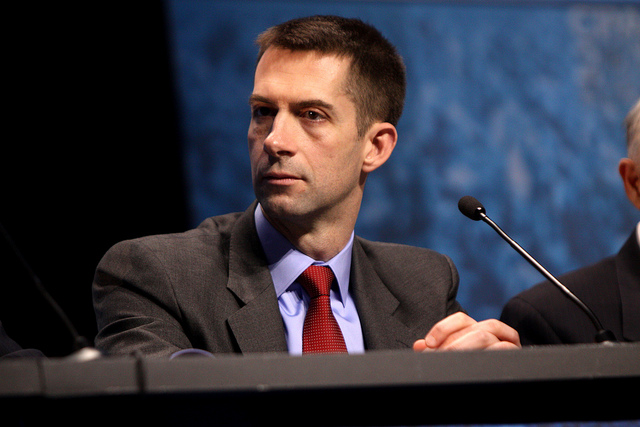by Derek Davison
Senator Tom Cotton (R-AR) told a receptive audience at the neoconservative Hudson Institute on Tuesday that Congress should take action to defeat the Joint Comprehensive Plan of Action (JCPOA), the nuclear deal that was concluded in Vienna earlier this month between Iran and the countries of the P5+1 (United States, United Kingdom, France, Germany, Russia, and China). The upcoming congressional vote to reject the deal “is a weighty decision,” Cotton said, “but it’s also not a hard one: the United States should reject this deal.”
The senator, a protégé of Iraq War architect and neoconservative éminence grise Bill Kristol, described “the Ayatollahs” as “grinning” as a result of the deal, though the questions of which Ayatollahs are grinning, and how Cotton knows they’re grinning right now, were left tantalizingly unanswered. In Cotton’s view, “this agreement abandons” the goal of depriving Iran of nuclear weapons capability, and “in its place, this deal gives Iran nuclear weapons capability, laying out an R&D roadmap for it to become a nuclear threshold state in barely a decade.” This is a unique interpretation of a deal that has won the backing of dozens of arms control experts, diplomats, and former national security officials.
Cotton is most famous for penning a letter to Iran in March, signed by himself along with 46 of his Republican senatorial colleagues, which attempted to scuttle the nuclear talks by warning Tehran that America would not abide by any nuclear agreement after Barack Obama left the White House, so his opposition to the deal comes as no great surprise. But the core of his Hudson talk focused on the “secret side agreements” that Iran and the International Atomic Energy Agency have concluded on the question of Iran’s past weaponization efforts, agreements that Cotton personally claimed to have uncovered:
I had to personally travel to Vienna last weekend, just to discover this shocking fact. The administration now admits that the side deals exist, but asserts that Congress cannot know their contents, despite the clear demands of U.S. law and the unprecedented stakes.
However, these “side agreements,” over which Cotton last week accused Secretary of State John Kerry of having “acted like Pontius Pilate” in Vienna (the senator steered clear of such inflammatory rhetoric in his Hudson talk), have always been built into the negotiation process. Iran’s talks with the P5+1 over a nuclear deal have been separate from Iran’s talks with the IAEA over revealing the “possible military dimensions” (PMD) of its past nuclear work, as IAEA Director-General Yukiya Amano explained to CNN’s Christiane Amanpour back in 2013. The JCPOA requires Iran to comply with the terms of the “Roadmap between the Islamic Republic of Iran and the IAEA for the clarification of past and present outstanding issues regarding Iran’s nuclear program,” an agreement that Iran and the IAEA concluded on July 14.
Cotton derided this part of the JCPOA, calling it “astounding” that the Obama administration would “blindly accept secret side agreements on this core issue, and ask Congress and the American people to do the same.” He likened “published reports” that “Iran will be able to provide its own samples to the IAEA” to “an NFL player providing his own urine samples to [NFL commissioner] Roger Goodell.” If Cotton has concerns about the IAEA’s role in monitoring and verifying Iran’s compliance with its nuclear requirements, he would be well-advised to spell them out, particularly in light of IAEA cables leaked in 2010 in which Amano told a U.S. diplomat that “he was solidly in the U.S. court on every key strategic decision” with respect to Iran’s nuclear program.
LobeLog’s Eli Clifton has reported on the close ties that Cotton has with two of the biggest opponents of an Iran nuclear deal: the Emergency Committee for Israel (ECI), which sunk nearly a million dollars into Cotton’s successful 2014 Senate campaign, and the Mujahedeen-e-Khalq (MEK). Cotton also shares with other deal opponents a preference for some unspecified “better deal” that somehow could have been had. However, in the past Cotton has been blunter than some other deal opponents in terms of describing his intentions, and in his Hudson speech he made it quite clear that an acceptable deal to him could only have been achieved via a total capitulation by Tehran, a scenario that has always been highly improbable at best:
Any agreement that advances our interests by necessity should compromise Iran’s interests. The Ayatollahs shouldn’t be happy with any deal. They should have felt compelled to accept a deal of our choosing, lest they face economic devastation and military destruction of their nuclear facilities. That Iran would welcome this agreement is both troubling and telling.
Cotton also pushed back against deal proponents who argue that the current sanctions regime against Iran is unsustainable in the long-term, and that it cannot now be rebuilt if Congress rejects the JCPOA. But although there’s good reason to think that the sanctions regime would have inevitably broken down in the absence of a deal, Cotton has nothing but conjecture to support his assertion that the rest of the world would agree to reimpose sanctions in the event that Congress rejects the deal. Such an act would at the very least require a repeal of the UN Security Council resolution on the deal that passed on July 20, and any repeal would be highly unlikely to avoid a Russian and/or Chinese veto. Of course, Cotton has also minimized the potential costs of a hypothetical military action against Iran, arguing (contrary to the opinions of regional experts) that destroying Iran’s nuclear program would require only “several days of air and naval bombing.” So it’s possible that he’s really not that concerned about whether the sanctions regime could be put back together.






Ah, yes. The U.S. Senator from Macao has spoken. (For those not versed in the intricacies of offshore Chinese gambling, Macau is one locus of Sheldon Adelson’s operations